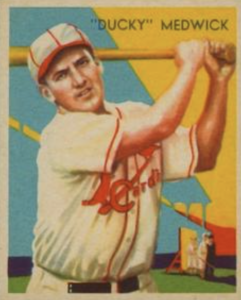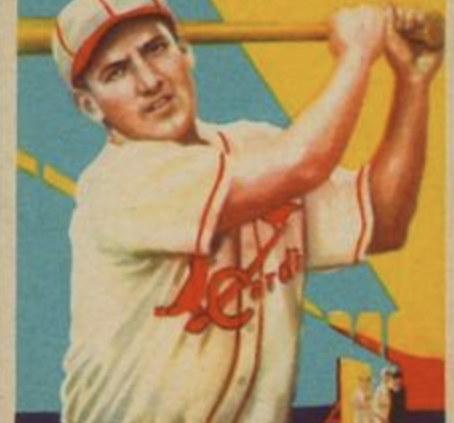September 16, 1933: Cardinals outlast Dodgers after 27 runs, 36 hits, and 17 walks
By the time the 1933 National League season was winding down on September 16, the St. Louis Cardinals had joined the Brooklyn Dodgers — their guests that day in Sportsman’s Park — in battling for little more than pride. The Cardinals had been mathematically eliminated from the pennant race the previous afternoon and stood 10½ games out of first place through 144 games.
battling for little more than pride. The Cardinals had been mathematically eliminated from the pennant race the previous afternoon and stood 10½ games out of first place through 144 games.
Since the dismissal of Gabby Street as manager on July 23, the Cardinals’ on-field leadership had been assumed by second baseman Frankie Frisch. To date, Frisch had steadied the club into fourth place with a record of 77-66 while his former team, the New York Giants, had built a commanding 7½-game lead on the Chicago Cubs and the Pittsburgh Pirates entering play that day. The Dodgers were mired further down in sixth place with a record of 57-80, sitting nearly a full 30 games from the top.
Yet, despite the lack of impact, the afternoon’s affair would have on the pennant race, Cardinals owner Sam Breadon was hopeful for a large Saturday crowd with a doubleheader in store.
He would be disappointed. So would the people who stayed home.
Relatively few souls jumped off the “70 Grand” streetcar line that ran by the ballpark. A total of 6,200 women were admitted free of charge for a ladies day promotion, and they were joined by only 2,800 paying customers. The fans who made the effort to be present, however, were entertained. “Those baseball boys had a rip-snorting time at the corner of Grand Boulevard and Dodier Street,” concluded J. Roy Stockton, the Cardinals beat writer for the St. Louis Post-Dispatch.1
Greeted with clear late-summer skies and steamy 92-degree temperatures, the Cardinals took the field. On the mound was Tex Carleton, who brought a 15-10 record and a 3.24 earned-run average into the contest and who, along with fellow second-year pitcher Dizzy Dean, had become a mainstay in Frisch’s rotation. After Buzz Boyle led off the game with a single, Carleton quieted the Dodgers bats over the rest of the first inning before the Cardinals came to the plate for the first time.
Carleton was opposed by Walter Beck, a native of nearby Decatur, Illinois. When the season’s final statistics were totaled, Beck led the National League in runs allowed; and in subsequent years with the Phillies, he would earn the nickname “Boom-Boom” — the sound that would echo through the park when his pitches ended up against the metallic outfield wall at the Baker Bowl in Philadelphia. But for now, Beck — after posting earned-run averages of 5.56 and 4.41 in limited duty in his first two major-league seasons with the St. Louis Browns — had found a groove. As he took the mound in Sportsman’s Park he carried a respectable 3.62 ERA, solidifying a spot in Max Carey’s rotation as he made his 32nd start of the season.
The Cardinals pushed across a run in the first inning in their classic small-ball fashion, with Pepper Martin drawing a walk, stealing second, advancing to third on a fly ball by Frisch, and scoring when Brooklyn right fielder Johnny Frederick misplayed a drive off the bat of rookie sensation Joe Medwick. They increased their lead to 2-0 in the second when Leo Durocher singled home Gene Moore, who had doubled in his first start in a Cardinals uniform.
A bunt single by Lonny Frey started a six-run rally for Brooklyn in the third inning. Frey was well known locally, having attended a Cardinals tryout two years earlier after losing his job at a St. Louis meat-packing plant due to the Great Depression. Playing sandlot ball on the evenings and weekends, Frey went unsigned by his hometown Cardinals after the tryout but inked a deal with the Dodgers organization a year later.
Five more Dodger hits followed Frey’s — including a double by Beck — propelling Brooklyn to a 6-2 lead. But the Cardinals answered with six of their own in the bottom half, five of which came off Beck before he was relieved by Rosy Ryan. Five of the runs were unearned, due to three errors by first baseman Sam Leslie.
A three-run homer by Medwick in the sixth upped the Cardinals’ advantage to 11-6. After Brooklyn cut the lead to 11-8, the Cardinals added to the lead again on a triple steal in the seventh, with George Watkins swiping home, Frisch third, and Medwick second. St. Louis relievers Bill Hallahan, and Syl Johnson faltered, however, and permitted three Brooklyn runs to send the game into extra innings with a 12-12 score.
A triple by Frey gave the Dodgers the lead in the top of the 10th, but the Cardinals responded once again. Durocher reached base with the 17th walk issued by the afternoon’s erratic pitchers and he scored on a double by Martin (as he swung, the bat slipped out of Pepper’s sweat-soaked hands — yet he still drove the ball into the gap in right-center). Watkins then followed with the winner, a blue-darter down the right-field line that rolled to the wall and plated the cheering Pat Crawford.
The 14-13 final score had taken an “interminable” 3 hours 28 minutes to play, a length quite common by modern standards but a veritable marathon in the 1930s. Johnson picked up the win while Ray Benge — normally a starter who was thrust into a relief role on the long afternoon — was tagged with his 17th loss for permitting the 10th-inning Cardinal tallies. The 14 runs by the Cardinals and 13 by the Dodgers were the third most and second most scored respectively by each club during the season.
Frey led the Dodgers at the plate with four hits and three RBIs. Beck drove in three himself, while Tony Cuccinello added three hits to the attack. For the Cardinals, the first five hitters in the lineup — Martin, Watkins, Frisch, Medwick, and Rip Collins — posted two hits apiece, while the young Medwick continued to establish himself as one of the great new run-producers in the game with five RBIs. Patrolling center field for the Cardinals all day long was the newcomer Moore, a promising young player who only a day earlier had arrived from the team’s farm club at Houston in the Texas League. In addition to his second-inning double, Moore walked, scored twice, and had an RBI in the first game, and then knocked a triple in the second game before it was halted by darkness after four innings.
“When they finally got around to squaring off for the second encounter, the shades of night were falling fast and darkening many a kitchen, where lonely husbands were looking longingly for the can opener,” Stockton wrote of the tired teams — and of the ladies day attendees still there watching them.2
The next afternoon was “Dizzy Dean Day” at Sportsman’s Park, as the city lauded its star pitcher. “His gifts included a new Buick, a crate of baby chicks, and five pigs.”3 While Frisch spent the remainder of 1933 positioning the Cardinals for their title run in ’34, the end was near for the two-year stint of Carey at the helm of the Dodgers, as his coach Casey Stengel would get the next shot at the manager’s job in Brooklyn.
This article appears in “Sportsman’s Park in St. Louis: Home of the Browns and Cardinals at Grand and Dodier” (SABR, 2017), edited by Gregory H. Wolf. Click here to read more articles from this book online.
Sources
In addition to the sources listed below, the author also consulted Baseball-Reference.com, Retrosheet.org, and SABR.org.
Notes
1 J. Roy Stockton, “Cardinals Outscore Brooklyn, 14-13; Second a Fadeout,” St. Louis Post-Dispatch, September 17, 1933: 1F.
2 Ibid.
3 Robert Gregory, Diz: The story of Dizzy Dean and Baseball During the Great Depression (New York: Penguin Books, 1992), 117.
Additional Stats
St. Louis Cardinals 14
Brooklyn Dodgers 13
10 innings
Sportsman’s Park
St. Louis, Mo
Box Score + PBP:
Corrections? Additions?
If you can help us improve this game story, contact us.


